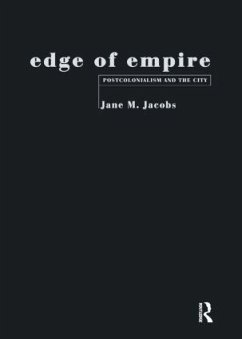The global reach of the book - its focus of two poles of one trajectory of British imperialism - provides a global assemblage which form a basis for understanding the unruly fortunes of imperialism over space and time. This is not simply a material geography of territory, it is also an imaginative geography of desire and memory.
Edge of Empire examines struggles over urban space in three contemporary first world cities in an attempt to map the real geographies of colonialism and postcolonialism as manifest in modern society. From London, the one-time heart of the empire, to Perth and Brisbane, scenes of Aboriginal claims for the sacred in the space of the modern city, Jacobs emphasises the global geography of the local and unravels the spatialised cultural politics of postcolonial processes.
Edge of Empire forms the basis for understanding imperialism over space and time, and is a recognition of the unruly spatial politics of race and nation, nature and culture, past and present.
Edge of Empire examines struggles over urban space in three contemporary first world cities in an attempt to map the real geographies of colonialism and postcolonialism as manifest in modern society. From London, the one-time heart of the empire, to Perth and Brisbane, scenes of Aboriginal claims for the sacred in the space of the modern city, Jacobs emphasises the global geography of the local and unravels the spatialised cultural politics of postcolonial processes.
Edge of Empire forms the basis for understanding imperialism over space and time, and is a recognition of the unruly spatial politics of race and nation, nature and culture, past and present.
'Tightly written and forcefully argued, Jane Jacobs does not just signpost the postcolonial, she also makes tracks and draws maps.' - Professor Nigel Thrift, University of Bristol, UK
'Tightly written and forcefully argued, Jane Jacobs does not just signpost the postcolonial, she also makes tracks and draws maps.' - Professor Nigel Thrift, University of Bristol, UK









